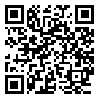Volume 8, Issue 1 (Autumn 2022)
Health in Emergencies and Disasters Quarterly 2022, 8(1): 65-76 |
Back to browse issues page
Download citation:
BibTeX | RIS | EndNote | Medlars | ProCite | Reference Manager | RefWorks
Send citation to:



BibTeX | RIS | EndNote | Medlars | ProCite | Reference Manager | RefWorks
Send citation to:
Mueller-Haugk S, Stueck M. Relationship of Anxiety Management Types and Health-related Variables of People During Lockdown in a German Sample. Health in Emergencies and Disasters Quarterly 2022; 8 (1) :65-76
URL: http://hdq.uswr.ac.ir/article-1-490-en.html
URL: http://hdq.uswr.ac.ir/article-1-490-en.html
1- International Biocentric Research Academy (IBRA), Leipzig, Germnany.
Abstract: (3950 Views)
Background: In the present study, four anxiety coping types and their relationship to bio- and health-psychologically relevant parameters were investigated in the first lockdown phase in Germany. The four anxiety management types are the non-defensive, represser, sensitizer and highly anxious. These types originate from a concept by Byrne (1961), Krohne (1974), whereby the handling of fearful information is examined. According to newer studies from Stueck (2021), these anxiety coping styles during lockdown are related to various other biopsychological and health psychological parameters.
Materials and Methods: To investigate the problem and question of the frequency of the anxiety types, the relationship to bio- and health-psychological parameters and age-specific characteristics of these variables, an experimental group was studied (N=325, f=164 m=57 d=1). This study took place 10 days after the lockdown in Germany.
Results: The problematic anxiety coping types (Sensitizer, Repressive & Highly Anxious) are represented by 54.2% frequency of occurrence. The Flexible-adaptive type (Non-Defensive) that is by having an acceptable adaptability to the anxiety-provoking situation are prominent with 45.8%. In terms of the correlations with the bio- and health-psychological variables, correlations were found between the problematic anxiety coping styles and the negative expressions in the variables.
Conclusion: The study shows the importance of a differential consideration according to age in the expression of problematic anxiety coping styles in particular. The study also shows what bio- and health-psychological consequences these manifestations of problematic anxiety coping styles can have. In the following article, indications are given as to which interventional strategies can be applied to deal with these problems psychologically.
Materials and Methods: To investigate the problem and question of the frequency of the anxiety types, the relationship to bio- and health-psychological parameters and age-specific characteristics of these variables, an experimental group was studied (N=325, f=164 m=57 d=1). This study took place 10 days after the lockdown in Germany.
Results: The problematic anxiety coping types (Sensitizer, Repressive & Highly Anxious) are represented by 54.2% frequency of occurrence. The Flexible-adaptive type (Non-Defensive) that is by having an acceptable adaptability to the anxiety-provoking situation are prominent with 45.8%. In terms of the correlations with the bio- and health-psychological variables, correlations were found between the problematic anxiety coping styles and the negative expressions in the variables.
Conclusion: The study shows the importance of a differential consideration according to age in the expression of problematic anxiety coping styles in particular. The study also shows what bio- and health-psychological consequences these manifestations of problematic anxiety coping styles can have. In the following article, indications are given as to which interventional strategies can be applied to deal with these problems psychologically.
Keywords: Pandemic management theory, Health psychology, COVID-19 and psyche, Biocentric health theory, Anxiety, Stress and coping, Disaster management, Biocentric-approach
Type of article: Research |
Subject:
Special
Received: 2023/02/5 | Accepted: 2023/01/1 | Published: 2023/01/1
Received: 2023/02/5 | Accepted: 2023/01/1 | Published: 2023/01/1
| Rights and permissions | |
 |
This work is licensed under a Creative Commons Attribution-NonCommercial 4.0 International License. |








